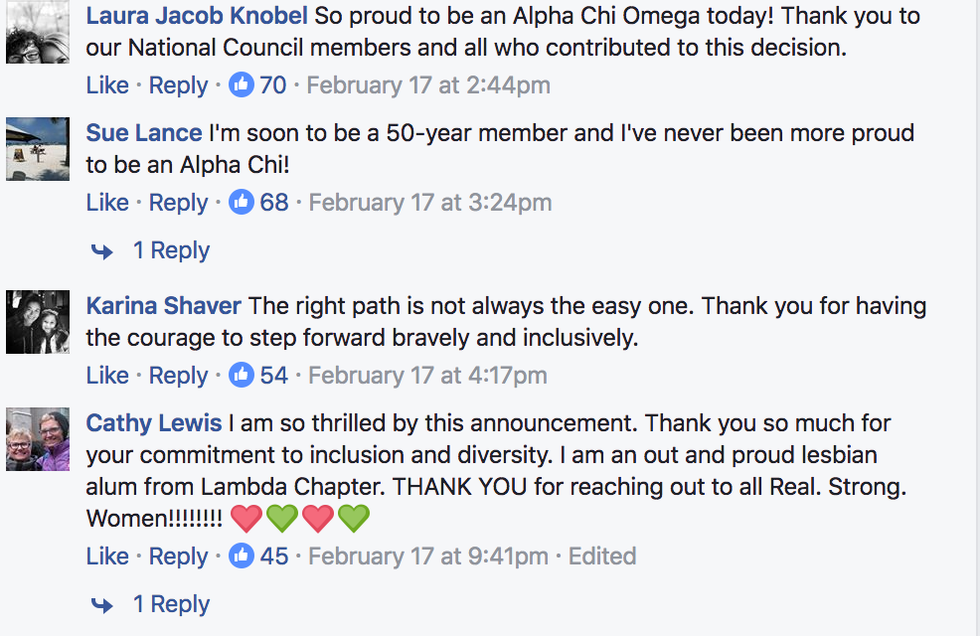On Friday, February 17, 2017, Alpha Chi Omega's (AXO) National President, Angela Harris, announced that AXO will now be inclusive, and that transgender individuals who identify and live as women who want to seek AXO membership will be offered the opportunity to become a part of AXO's sisterhood. According to the full letter from Harris (found at the end), "Alpha Chi Omega must be inclusive of all who live and identify as women, regardless of their gender assigned at birth."
According to Cosmopolitan, of the 26 major national sororities (over 4 million women strong) that are on campuses nation-wide, only three of them have policies that state they are inclusive of transgender women. These three sororities include Delta Gamma, Kappa Kappa Gamma and Sigma Sigma Sigma. But now AXO can be added to this list. AXO's National Council decided to redefine the concept of sisterhood and the sorority experience overall after taking into account the current stance on gender and how gender is not necessarily the gender you were born with- also, noting that transgender women have reached out to AXO chapter's seeking membership.
The National Panhellenic Council (NPC) is a staff of adult professionals who oversee the 26 national sororities, but the organizations or sororities that are apart of the NPC are separate entities in that they set their own membership standards individually. According to Dani Weatherford, the NP executive director, the issue of allowing transgender women to become a member is up to each sororities’ national offices, 23 of which pass the decision off to their collegiate chapters. Ultimately, the decision is up to the women who currently make up the chapter.
Though there are only three sororities with public policies regarding membership for transgender women, there are campuses within the U.S. that have started to open recruitment up for students who identify as female based on a decision by the specific University's Panhellenic Council, who oversees the annual recruitment process for all sororities on campus. Brown is one campus that has taken action in this manner. One student at the University of Michigan, Emily Kaufman, was the first transgender woman to take part in recruitment. After going through recruitment twice, she ultimately didn't end up with a bid.
While Kaufman's experience didn't receive a bid to a sisterhood on her campus, the responses to Harris' video were positive, with most women who were or still are apart of the organization, applauding AXO's decision.
With currently only four formal public policies addressing the issue of membership for transgender women and a handful of college campuses making that decision campus-wide. How many sororities will follow in AXO's footsteps and make a public, formal policy allowing all women, either by birth or identification, to become members?
Harris' full letter is as follows:
Over the past year, Alpha Chi Omega and its National Panhellenic Conference peers have been challenged to reexamine the concepts of sisterhood and sorority through the lens of a quickly changing landscape.
Alpha Chi Omega is, as it always has been, an organization for women. The mission of our organization is clear: From advocating for domestic violence awareness and teaching women of all ages how to cultivate healthy relationships, to providing leadership and education opportunities, Alpha Chi Omega exists to develop and empower strong women. If we are to continue to live this important mission in today’s world, Alpha Chi Omega must be inclusive of all who live and identify as women, regardless of their gender assigned at birth.
In recent months, members from chapters in all parts of the country have sought guidance about transgender women who have expressed interest in joining our Fraternity. These inquiries were not made out of fear or obligation; they were born from our sisters’ sincere desire to create a sorority experience that more fully reflects the realities of today’s women, in today’s world. This announcement is about meeting our collegians where they are and responding to their calls for inclusion.
This position is the result of extensive National Council deliberation, best-practices research, legal consultation and frontline discussions with higher-education and sorority/fraternity life thought leaders. It did not emerge as a reaction to external influences, but from introspection about how Alpha Chi Omega will continue to redefine the sorority experience.
This does not, in any way, alter our National Membership Standards. Our chapters will continue to recruit potential new members based on: 1] academic interest; 2] character; 3] financial responsibility; 4] leadership ability; and 5] personal development.
Today, our Fraternity is more than 230,000 members strong. We recognize that for some of those 230,000 sisters, embracing this position means adopting a new mindset. And as our understanding of gender identity evolves, so must Alpha Chi Omega.
The power of women’s organizations is real and necessary. This remains true today more than ever. I hope you will stand with me, and the rest of the National Council, in embracing Alpha Chi Omega’s inclusive approach.




















